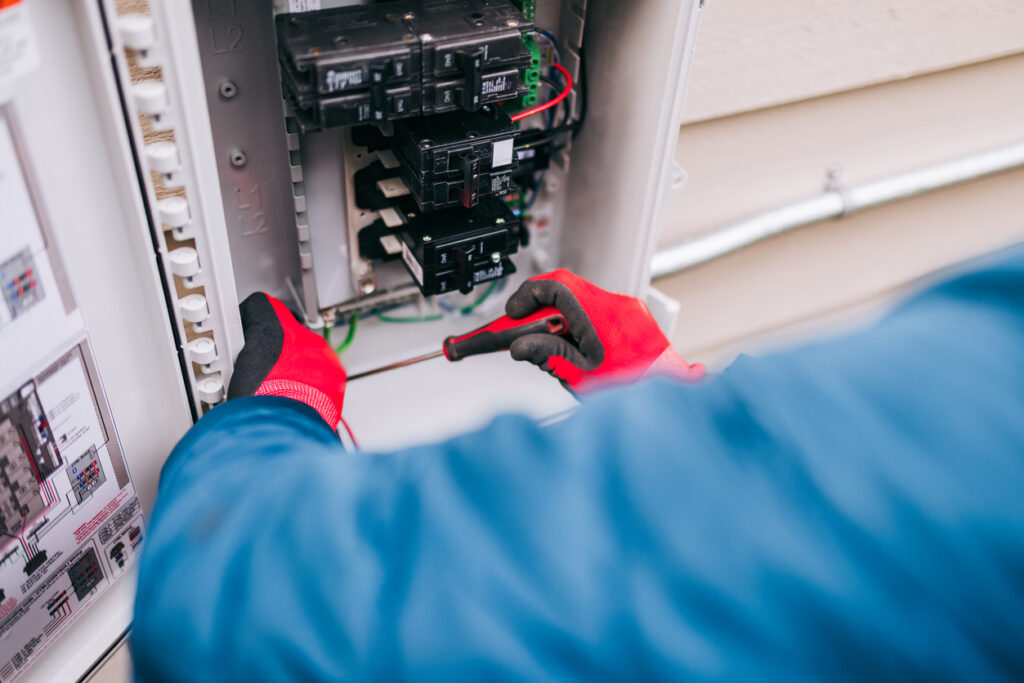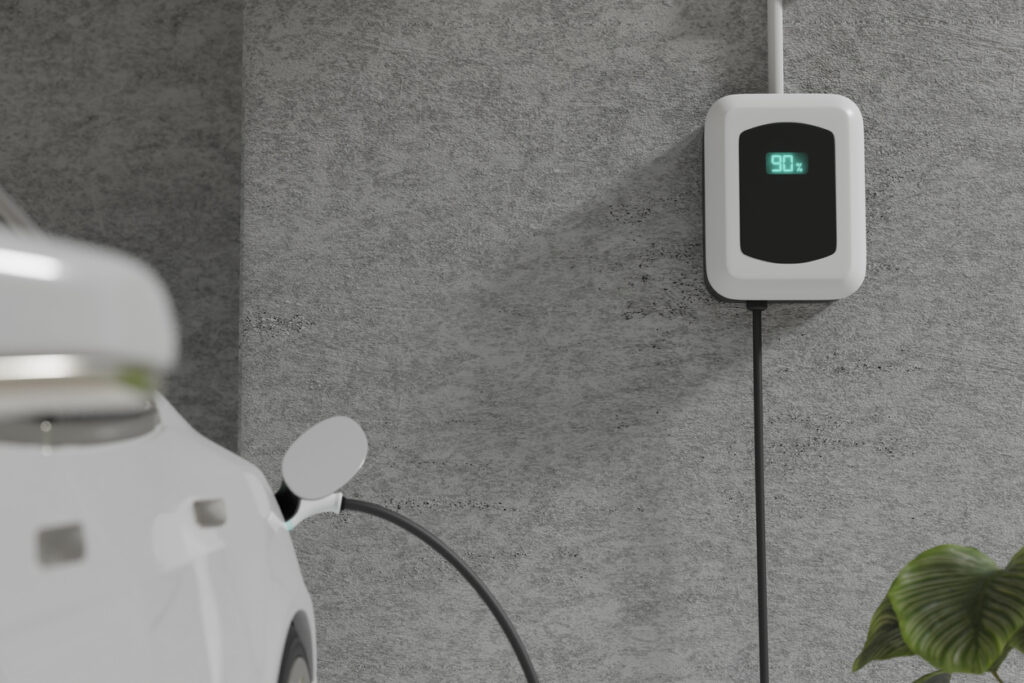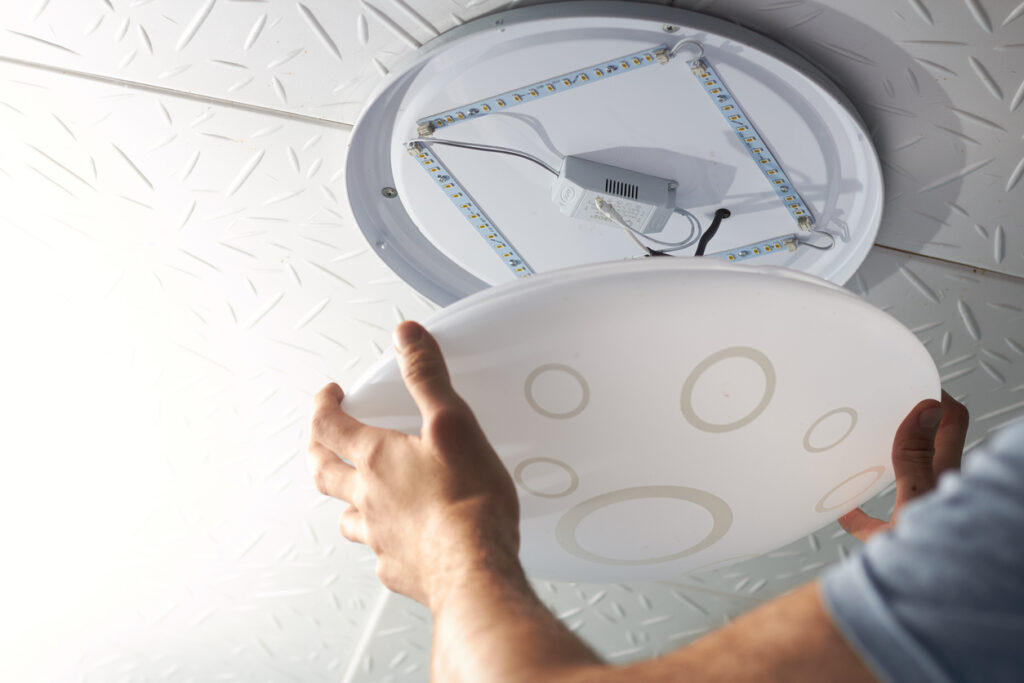As electric vehicles (EVs) continue to gain popularity, many homeowners are considering the benefits of getting an EV home charger installation for their residences.
An EV home charger offers convenience, cost savings, and an environmentally friendly charging solution. With the right setup, you can charge your vehicle overnight, ensuring it’s ready for the day ahead.

This blog explores the advantages of home charger installation for electric vehicles, answers common questions, and provides insights into costs, efficiency, and long-term benefits for EV owners.
Is it Worth Installing an EV Charger at Home?
Installing an EV charger at home is a valuable investment for many electric vehicle owners. Here are some of the benefits:
Convenience
The most obvious benefit is convenience—charging your car at home means never having to make a special trip to a public charging station. You can plug in your vehicle overnight and wake up to a full battery, ensuring that your car is always ready for your daily needs.
Long-Term Savings
An EV home charging installation can lead to long-term savings.
Public charging stations often come with higher fees and can be less convenient, especially in areas with fewer stations. By installing a home charger, you gain control over when and where you charge your vehicle, often at a lower cost compared to public stations.
Environmentally Friendly
Home charging is also more environmentally friendly.
You can take advantage of solar power if your home is equipped with solar panels, further reducing your carbon footprint. With EV adoption expected to grow, installing an EV charger now can also increase the future value of your home, especially if you live in an area where electric vehicles are becoming more common.
Do Most EV Owners Charge at Home?
The majority of electric vehicle owners charge their cars at home.
In fact, studies show that approximately 80% of EV owners rely on home charging as their primary method. This is due to the convenience of plugging in overnight, ensuring the vehicle is fully charged for the next day’s activities.
Home charging stations are often more cost-effective than public charging stations, which may charge higher fees and have limited availability.
Additionally, charging at home provides owners with greater flexibility, allowing them to charge whenever it suits their schedule. As EV ownership grows, this trend is likely to continue, making home chargers an essential feature for most EV owners.
Does an EV Charging Station Add Value to Your Home?
Installing an EV charging station can add value to your home, especially as electric vehicles become more common.
For potential buyers who own or plan to purchase an EV, having a home charging station is a significant convenience. It eliminates the need to rely on public charging stations, which can be inconvenient or limited in some areas.
In regions where EV ownership is on the rise, having an EV charger can make your home more appealing to eco-conscious buyers or those looking for modern, future-proof amenities. This addition may not only make your home more attractive but could also increase its market value, particularly in high-demand neighborhoods or areas with a higher concentration of electric vehicle owners.
What Does it Cost to Install an EV Charging Station at Home?
The cost of installing an EV charging station at home can vary depending on several factors.
On average, homeowners can expect to pay between $500 and $2,000 for the charger itself, with installation fees ranging from $200 to $1,000. The total cost depends on factors such as the complexity of the installation, whether electrical upgrades are needed, and the type of charging unit chosen.
For example, Level 2 chargers, which are faster and more efficient, tend to be more expensive than basic Level 1 chargers. It’s important to consult with a professional to determine the exact costs based on your home’s electrical setup.
How Long Do EV Batteries Last?
The lifespan of an electric vehicle (EV) battery typically ranges from 8 to 15 years, depending on factors such as the battery type, usage, and climate conditions.
On average, most EV batteries are designed to last for around 100,000 to 150,000 miles. However, advances in battery technology and improvements in charging methods are helping to increase the longevity of these batteries over time.
Factors that Influence an EV Battery
Several factors can influence the lifespan of an EV battery.
For example, frequent fast charging, extreme temperatures, and maintaining a high state of charge for prolonged periods may shorten the battery’s life. Conversely, moderate driving habits, charging to around 80%, and avoiding extreme temperatures can help extend the battery’s useful life.
Manufacturers typically offer warranties on EV batteries that cover 8 years or more, with some even offering coverage up to 100,000 miles. This provides owners with peace of mind, knowing that if the battery does lose significant capacity during this period, it will be replaced or repaired.
Overall, while the longevity of an EV battery can vary, proper care and mindful charging practices can ensure that the battery lasts for many years, providing owners with a reliable and efficient electric vehicle for an extended period.
Difference Between Level 1 and Level 2 EV Home Chargers
Level 1 and Level 2 chargers differ mainly in their charging speed.
Level 1 chargers use a standard 120-volt outlet and are ideal for light usage, typically providing around 3 to 5 miles of range per hour of charging. They are the slowest option but don’t require special installation.
Level 2 chargers, on the other hand, use a 240-volt outlet and offer much faster charging, providing 25 to 60 miles of range per hour. While they require professional installation, Level 2 chargers are the best choice for daily use, especially for owners with higher driving needs.
Which EV Home Charger Should You Choose? Level 1 or Level 2?
Choosing between them depends on your driving habits and how quickly you need your vehicle charged. If you typically drive short distances and can charge overnight, a Level 1 charger may suffice. However, for faster charging and more convenience, a Level 2 charger is the best option.
How Happy Are EV Owners?
Electric vehicle owners are generally very satisfied with their vehicles, with most reporting a high level of happiness.
Many appreciate the environmental benefits of driving an EV, as it reduces their carbon footprint and reliance on fossil fuels. Additionally, EV owners enjoy lower maintenance costs compared to traditional gasoline-powered vehicles, as EVs have fewer moving parts and require less frequent servicing.
Another significant factor contributing to the happiness of EV owners is the convenience of home charging. The ability to charge overnight, waking up to a fully charged car each morning, is a convenience many find appealing. Additionally, EVs often offer a smooth and quiet driving experience, making them a pleasure to drive.
That said, some EV owners do express concerns about range anxiety, the availability of charging stations, and the initial purchase price, which can be higher than that of traditional vehicles. However, the growing infrastructure of charging stations and decreasing prices for EVs are helping to alleviate these concerns.
Overall, EV owners tend to report a high level of satisfaction, particularly as the technology continues to evolve and improve, making electric vehicles an increasingly attractive and enjoyable option for everyday driving.
How Efficient Are Home EV Chargers?
Home EV chargers, particularly Level 2 chargers, are highly efficient, providing a faster and more consistent charge compared to standard outlets. They typically convert 85-90% of the electricity they draw into usable energy for the vehicle, making them more efficient than many public charging stations.
Charging times are also quicker, with Level 2 chargers offering 25 to 60 miles of range per hour, depending on the vehicle and charger specifications. This efficiency makes home charging both time-saving and energy-efficient for EV owners.
Can I Leave My EV Charger Plugged in When Not in Use?
You can leave your EV charger plugged in when not in use.
Modern chargers are designed with safety features that prevent overcharging or energy waste when the vehicle is fully charged. However, if you want to be cautious, you can unplug the charger to conserve energy, but it is not necessary.
The vehicle and charger communicate to ensure that no excess energy is drawn once the battery is fully charged.
Should I Charge My EV to 100% at Home?
It is generally not recommended to charge your EV to 100% at home regularly.
Charging to 100% can put stress on the battery over time, potentially shortening its lifespan. Most experts recommend charging to around 80% for daily use. However, it is okay to fully charge your EV occasionally, such as before a long trip, to ensure you have enough range.
Many EVs also allow you to set charging limits, so you can easily manage the battery’s health.
Do EV Owners Pay for Charging?
EV owners generally pay for charging, but the cost depends on where and how they charge.
Home charging typically costs less, as owners pay for electricity through their regular utility bill. Public charging stations may charge higher fees, and some offer subscription services or pay-per-use models. Charging costs at home are generally more economical, especially if done during off-peak hours.
Some EV owners may also benefit from free charging at certain locations or through employer-sponsored programs.
Do Home EV Chargers Need Maintenance?
Home EV chargers require minimal maintenance, but periodic checks are important to ensure they continue functioning efficiently and safely.
Inspect the charger for any signs of wear or damage, especially the cables and connectors. It’s also a good idea to periodically clean the unit to prevent dust or dirt buildup, which could affect performance.
Additionally, it’s recommended to check the software of the charger, as some models have firmware updates that may improve performance or safety features. If any issues arise, contacting a certified technician for a thorough inspection or repair can ensure your charger operates at its best.
Regular maintenance helps extend the lifespan of the charger and maintain its efficiency.
How Much Does EV Charging Increase My Electric Bill?
The cost of charging an electric vehicle (EV) at home will vary based on the vehicle’s battery size, how often you charge, and your local electricity rates.
On average, charging an EV may increase your monthly electric bill by about $30 to $60. However, this can vary depending on the charging time (off-peak hours may cost less) and the efficiency of your charger.
Charging during off-peak hours or using a time-of-use plan can help reduce costs.
EV Home Charger Installation at Milk Electrical
When it comes to EV home charger installation, Milk Electrical is the trusted choice for homeowners seeking professional, reliable service.
Our experienced technicians ensure seamless installation and provide tailored solutions to meet your specific needs. With expertise in both high and low voltage services, Milk Electrical guarantees quality and safety for your installation.
For more information or to schedule your installation, contact Milk Electrical via our online form or call 818-479-7994.
Conclusion
Installing an EV home charger offers numerous benefits, from convenience and cost savings to increased home value.
It allows you to charge your vehicle overnight, ensuring it’s ready for your daily needs without the hassle of public stations. While the initial installation cost can vary, the long-term savings and efficiency make it a worthwhile investment.
As electric vehicles become more common, having a home charger is not only practical but also a smart addition for future-proofing your home.
Whether you’re an eco-conscious driver or simply seeking convenience, EV home charger installation is a step toward a more sustainable and efficient future.









